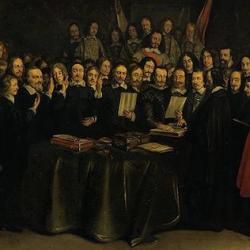In an essay on the Brandenburg Calvinist pastor John Bergius, Bodo Nischan observes that “Unlike most Protestants and Catholics at the time, Bergius did not think that a ruler should impose his religion on his subjects. True faith, he argued, could never be forced on people,” and he charged that Protestant attempts to impose a single faith repeated “the error of the Spanish in America and the Catholics in the empire who were trying to convert people by force.”
Rather than imposing a confession or prayer book, “a ruler who wants to reform his church must proceed slowly, persuading by Christian love and the logic of his arguments rather than by force and violence.” He has to be patient with “those who do not see their errors lest he offend their consciences and thereby cause additional divisions ‘that are often worse than the error he set out to correct.’” He advocated what has been called a policy of “convergence” – patience, with the hope that a religious consensus will emerge.
In his view, it was a political reversion to a Papalist tyranny: “Not long ago, Bergius complained, everybody was yearning for greater spiritual freedom from the pope and the emperor; now, even subjects presumed to dictate their ruler’s religion. Instead of being loyal to their prince, they attack him and commit lese majeste by appealing to foreign rulers such as the king of Poland.”
Bergius didn’t deny that a ruler is responsible for defending the truth faith. But he didn’t believe that the “true faith” was confined to one set of articles or one confession. For both theological and political reasons, “A ruler therefore could tolerate different churches in his realm, indeed for the sake of peace and stability had to tolerate two churches as closely related as the Lutheran and Reformed.”
(Nischan, “Calvinism, the Thirty Years’ War, and the Beginning of Absolutism in Brandenburg: The Political Thought of John Bergius,” Central European History, 15:3 [Sep., 1982]: 203–223.)















